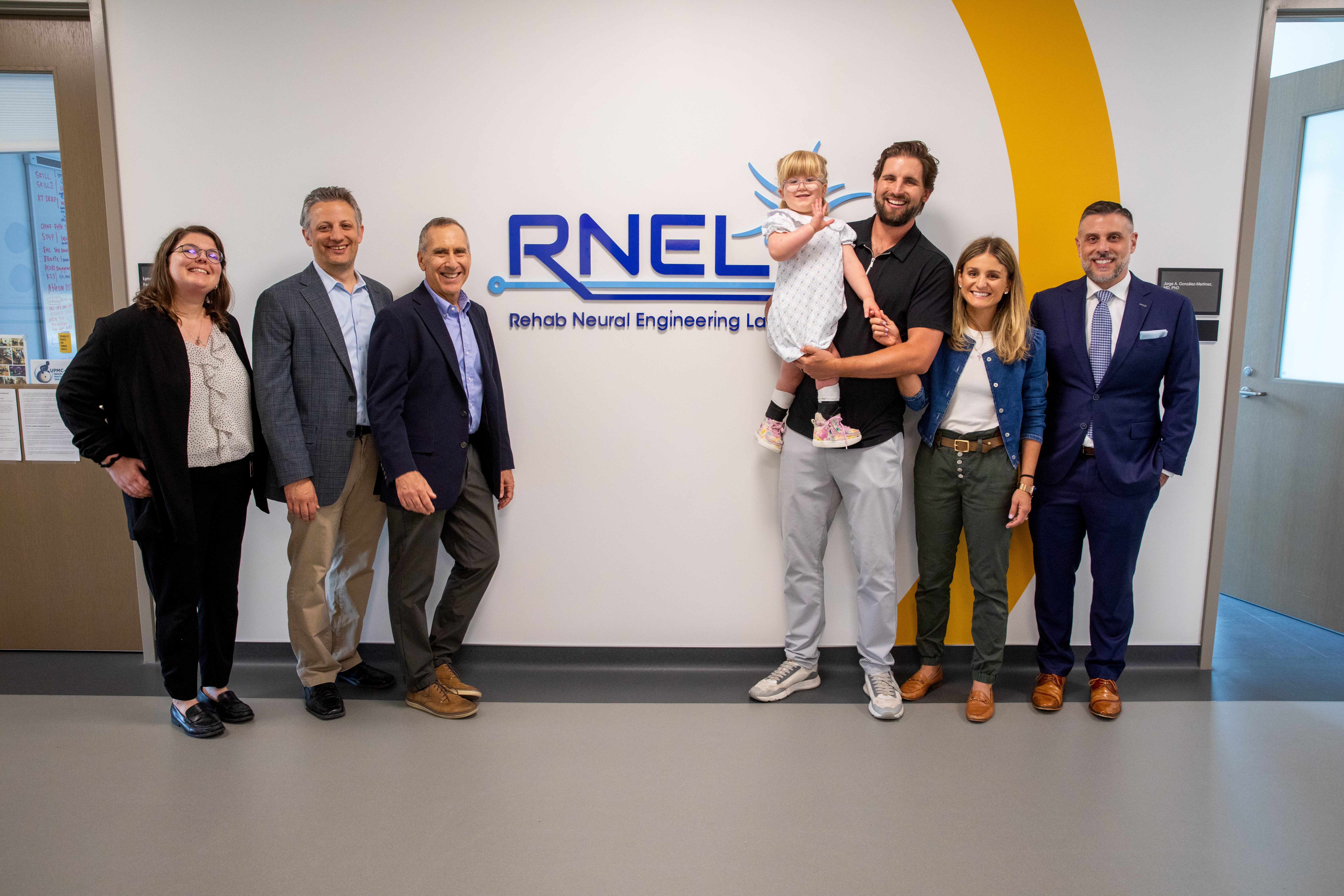 By Ana Gorelova
By Ana Gorelova
Photographs by John Dillard, UPMC and Pitt Health Sciences
A $1.05 million gift, announced Sept. 29 by the Harpey K Foundation, will establish the Harpey K Research Fund at the University of Pittsburgh’s Rehab Neural Engineering Labs (RNEL). This fund will drive RNEL’s multidisciplinary team to bring personalized solutions to spina bifida care.
RNEL, part of the Department of Physical Medicine and Rehabilitation at Pitt, is a global leader in neural engineering research, uniquely positioned to translate scientific discoveries into real-world clinical solutions. Its work spans applications in stroke, spinal cord injury and limb loss, developing technologies that restore function and independence. Located within the UPMC Rehabilitation Institute, the lab’s proximity to an outpatient rehab clinic is integral to its mission: improving the lives of individuals with neurological impairments through innovation and collaboration.
“Kids with spina bifida are amazing and unique—but most treatment plans available today are extremely generic. To me, that is an old-school way of looking at medicine,” said Jesse Scalo Kenning, founder of the Harpey K Foundation.
“Leveraging RNEL’s state-of-the-art technology and UPMC’s clinical capabilities will help us develop customized approaches to care that will treat my daughter Harper and other kids like her as individuals, not as ‘spina bifida patient #3742.’ That, to me, is the future of medicine,” she added.
Since its founding, RNEL has united researchers, engineers, physical therapists and physicians from Pitt and UPMC to pioneer breakthroughs—such as enabling a paralyzed patient to feel touch through a mind-controlled robotic arm, using spinal cord stimulation to improve mobility in people with limb amputations and improving function in people with partial arm paralysis. Now, thanks to the Harpey K gift, RNEL’s impact will reach even further.
With the fund’s support, RNEL will extend its cutting-edge studies to spina bifida, applying advanced neurotechnology and scientific expertise to advance research in gait, bladder function and chronic pain.
“This gift allows us to extend our research toward a population that’s been understudied, and gives us the flexibility to explore bold ideas,” said Michael Boninger, Distinguished Professor of Physical Medicine and Rehabilitation, School of Medicine, and a founding director of RNEL. “As a center of excellence in spinal cord injury and home to world-class expertise in spinal cord stimulation, RNEL is uniquely positioned to lead in spina bifida.
“There are tons of studies on spinal cord stimulation in spinal cord injury—and almost nothing in spina bifida. With our unique setup bringing together researchers and clinicians, we will be able to bridge that research gap and bring clinical solutions to kids with spina bifida, making a real difference in their lives.”
The new research program, launched in early September, was developed in close partnership with the Scalo-Kenning family, whose ultimate vision is for UPMC and RNEL to become a national center of excellence for spina bifida, making its best-in-class care even more accessible to families in Pittsburgh and across the country.
“Harper and her parents bring an energy that’s truly transforming our lab,” said Boninger. “There’s nothing that drives clinical innovation faster than a deeply engaged patient and parents who care about the science and want to make a difference. Their insight and passion have shaped every aspect of this fund.”
Beyond research, the fund lays the groundwork for future collaboration between RNEL and clinical teams, some of which are located on the same floor as RNEL. This proximity fosters seamless collaboration between researchers and clinicians, creating a uniquely integrated ecosystem for translational care.
“This initiative supports a vision of personalized, integrated care across the lifespan, starting in childhood and transitioning through adulthood,” said Brad Dicianno, professor of physical medicine and rehabilitation, School of Medicine, and director of the UPMC Adult Spina Bifida Clinic.
“Spina bifida is a lifelong condition that affects nearly every organ system. As kids grow, they face challenges with mobility, function, bladder problems and even chronic pain,” he said. “A program like this can support Harper and other children like her as they transition into adulthood and lead to new clinical protocols that help patients live more comfortable lives—with better function and greater independence.”
